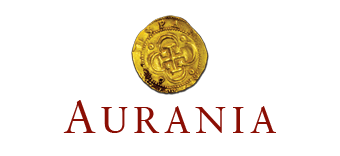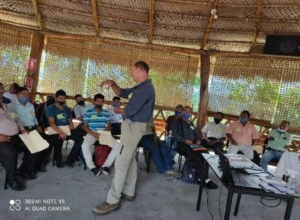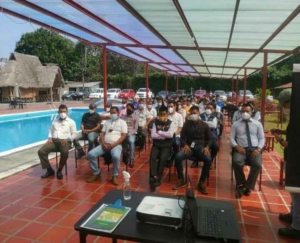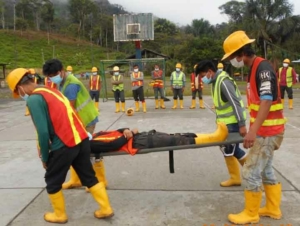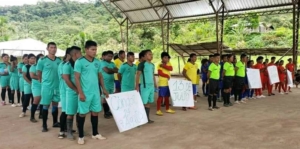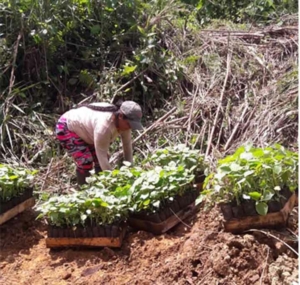Approach and Objective
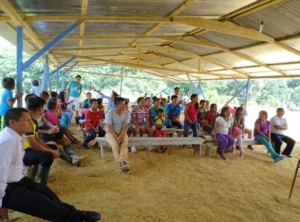
Figure 1. An initial meeting with a community in which the Company is seeking permission to explore the communitys land
Human and Indigenous rights, and the right of nature to be respected, have been enshrined in the Ecuadorian constitution. Respect for those individuals and collective rights form the foundation of Aurania’s relationship with the community and government.
Our objective is to develop a mutually beneficial and respectful relationship with local communities within the direct area of interest (DAI) of the mineral concessions in Ecuador (the Project) that have been granted to Aurania by the Ecuadorian government. By working with the communities, landowners, and government, we strive for the mutual recognition of the rights of these parties as a means of empowering each one to play a core role in planning and implementing a strategy for achieving an economically sustainable future for the region.
Management Model
Management of the social component of the Project involves striking a balance between the interests and plans of the communities, government on a national, provincial, canton level, and the Company. Transparency is key to the success of this tripartite relationship.
FUNDAMENTAL PILLARS OF MANAGEMENT
- DIALOGUE AND PARTICIPATION OF ALL KEY PARTIES
- INPUT FROM LOCAL COMMUNITIES TAKING INTO ACCOUNT THEIR TERRITORIAL DEVELOPMENT PLANS
- LABOR RECRUITMENT POLICY
- TRANSPARENCY
- ABSOLUTE REJECTION OF DISCRIMINATION INCLUDING ON THE BASIS OF GENDER, SEXUAL ORIENTATION, RACE & ETHNICITY
We consider dialogue as a continuous intercultural process where everyone can exchange ideas on equal terms. Open communication creates the opportunity for all community members to participate in discussions that lead to decisions that may affect them.
Dialogue and Participation
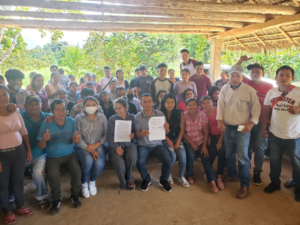
On a decsion by the council to hear about Aurania’s exploration approach and work program, an invitation is extended by the community to the Company. Exploration plans are then presented to the community at a meeting convened by the leadership. These information meetings are always held in the community to ensure that it is relatively easy for all members to attend, thus ensuring that everyone has access to the information. These sessions usually involve presentations by a member of the exploration team, along with a representative of the environmental and water team under the coordination of the CSR team.
There is no limit to the number of these information meetings – some communities sign access agreements during the first meeting with the whole community – others take multiple meetings after which the answer may still be “No, we’re not ready for you to explore our land,” in which case the Company withdraws until such time as it is invited back to make another presentation. There are some communities with which access agreements have still not been signed. The Company maintains an open door to these communities.
Government
Planning sessions are held periodically with the head counselors of the communities to address points that are of mutual interest to multiple communities. These meetings are usually held in a central location like Macas.
Meetings and planning sessions involving community counselors, various levels of government from canton, municipal, provincial and central, and the Company, are key to identifying central issues and finding ways of resolving them in practical and cost-effective ways.
Community Relations
Negotiations between each community and the Company define and prioritize social projects, an associated budget and timeline for delivery. Once this initial working relationship has been established, local government may become involved in sharing the work and budget.
The priorities in each community are based principally on the following factors:
- Relevance – The proposed projects need to be in the best interests of the majority of members of the community and they need to be carefully prioritized to achieve as broad a reach as possible.
- Social Impact – The aim is to initiate, and where possible generate, positive and long-term transformations in the quality of life of community members.
- Impact Measurement – There would ideally be a quantifiable means of measuring the impact of each project on the quality of life of each community.
Health and Safety
The most fundamental health concern in the region is that water used by the communities is contaminated with human and animal waste. The basic human right of access to clean and potable water is the first step towards improved healthcare in the region. Improving water quality is a high priority. Details of Aurania’s water initiative is covered in the Water section of our website.
Poor access to the communities, as well as between neighbouring communities, means that access to healthcare is limited; 15 of the 55 communities have access to medical clinics at three centres. Aurania is working with the Ministry of Health in providing access of “Medical Brigades” composed of teams of doctors, to the communities in the interior of the Project area.
Aurania identified the clinic run by the Ministry of Health at Piankas, in the southern part of the concession area, as strategic because of its location on a route used by multiple communities. Aurania financed and contract-managed the completion of the clinic, along with the installation of some basic equipment which has helped the doctors from the Ministry of Health to provide more comprehensive medical attention to members of the surrounding communities.
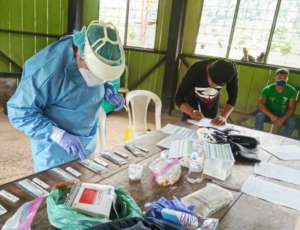
Figure 7. A batch of COVID-19 tests being readied to test residents of a local community before entering the work place
Hazard awareness and safety training are crucially important in this remote, wet, and slippery environment, and Aurania very often provides the first training of this type ever undertaken by community members. Field team leaders provide a summary of key safety awareness items each morning before their crews leave for the field. This concentration on health and safety amounted to over 8,000 hours of awareness training in 2020.
Due to the COVID-19 pandemic that started in March 2020, Aurania contracted two medical doctors and a third doctor who works part-time, to work on rotation to ensure that a doctor is available at the drill camps 24/7, while providing medical support to the exploration teams and surrounding communities. These doctors administer rapid and PCR tests for COVID-19 when staff return to the field from their field-breaks at home. Since March 2020, Aurania has run 2,138 COVID-19 tests on its personnel, 1,417 of these tests were on residents of the communities with which it is working. These doctors work closely with the Ministry of Health’s district doctors, in not only treating patients, but on ensuring that the isolated communities received factual data about the pandemic and how to restrict its spread.
Land Rights
One of the most significant concerns of Indigenous communities in the DAI is the perception that there is risk of losing their land. The land is very often not only their most significant economic asset but is also central to the culture, history and ancestral traditions of the Shuar people. Aurania helps communities in the DAI to formalize their land rights with the National Forestry Directorate within the Ministry of the Environment. Aurania provides training to community members to record the extent of their land with a differential GPS. The establishment of boundaries between communities frequently involves delicate negotiations between neighbours. A clear definition of land ownership helps Aurania to avoid inadvertently crossing into the land of a community with which it does not have an access agreement.
Employment
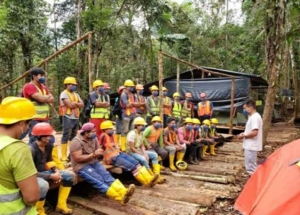
Figure 8. Morning briefing to community members involved in one of the exploration drilling operations
The principal initial connection with communities is employment: through work, community members earn wages, and in most instances, this is the first time that they have earned a salary within the bounds of the community without having to travel to adjacent towns or cities for work.
For many of the community members, their work with the Company is their first formal contract employment. The Company hires guides for its various teams, be that exploration, CSR, water, environment or logistics. We also contract services from the communities such as canoe- and mule-hire for transport of equipment, access to community airstrips for light planes and where feasible, we buy food and produce from the communities.
The hiring process ensures that priority is given to people from the community in whose land we are working, and only if there are insufficient people available and willing to work, will we hire from adjacent communities.
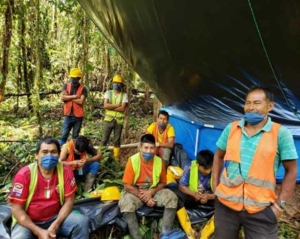
Figure 9. Debriefing after installation of a plastic sheet to feed rainwater into a temporary swimming pool repurposed at a storage tank blue with metal posts
Each community member that is contracted by the Company signs a temporary worker contract in compliance with Ecuadorian labour regulations. Registration with the tax authorities requires a citizenship identification document and the authorities assist in obtaining this document for those who don’t have formal registration.
In 2020, 699 people from 63 communities were hired by the Company. Short-term work contracts allow a person to work up to a total of 180 days per year in two consecutive years, after which they are encouraged to register as service-providers with the tax authorities (SRI), which allows these individuals to be paid on presentation of an invoice to the Company. People working under short-term contracts have medical aid from the day that they start work. Women represented 8% of the total people who worked for the Company under contract in 2020.
One of the issues related to the contract work is that a perception can easily develop that some people are being given preferential access to these temporary work contracts by the leadership of the communities. The Company has contracted individuals from the communities to help their leadership manage the rotating roster of people who want to work, to ensure fair and equitable access to this opportunity.
Youth Education
There is a shortage of schools in the DAI; only 34 of the 55 communities have schools. Incentivizing qualified teachers to live where the schools are located is a significant challenge considering that it is practically impossible to leave for a weekend due to the poor infrastructure. In addition, the Shuar language and aspects of the Shuar culture are being lost through inadequate educational support. Aurania is working with the communities, the Ministry of Education and the Step Forward Foundation on identifying ways to address these challenges.
Children in communities without schools walk to neighbouring communities to attend class. Aurania, in conjunction with the Step Forward Foundation, provided materials while the community provided the labour to refurbish a school in a village from which children were previously walking three hours each way to a school in a neighbouring community. Aurania is working with the Ministry of Education to strengthen its reach in the region. In addition to the focus on STEM (science, technology, engineering and mathematics), education also underscores the importance of maintaining the Shuar Indigenous language and culture.
Adult Education
The opportunity to complete primary and secondary school education by adults is a necessity that requires careful evaluation, planning and implementation in the DAI. We are analyzing the cost-effectiveness of multiple options that will be discussed with community leaders and their counsels in due course.
Aurania’s field geologists provide in-house training to Shuar people with appropriate aptitude and interest to become field technicians to run components of the exploration program such as stream sediment and soil sampling programs. Graduates work under the close guidance of our field geologists and subsequently run their own work teams under surveillance of a senior field technician or a field geologist. Eight people from five communities have received this technical training.
Culture and Sport
There is a concerted effort by the communities to retain the Shuar language and traditions. To this end, it is essential that the majority of the teachers in the schools are native Shuar speakers.
In 2019, Aurania supported the Step Forward Foundation’s intercommunity sports event called Warastai, believed to be the first of its kind in the DAI. Ten communities participated through elimination matches in soccer, indoor football and Ecuavolley (a three – per side type of volleyball). Fifteen men’s teams and ten women’s teams played involving 155 and 100 people respectively during the weekend matches through the eliminatory rounds. Approximately 1,460 people attended the final matches, a day that featured traditional activities including weaving canoes out of reed stems, a blowpipe-dart shooting competition, javelin throwing and a fishing competition in which children used the traditional method of catching caracha (Transancistrus species) with their bare-hands where the fish lurk under overhanging rock formations.
Due to the COVID-19 pandemic, the sports event was cancelled in 2020, but is planned for 2021.
Infrastructure and Connectivity
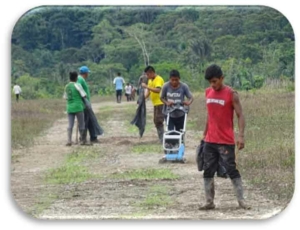

Figure 12. Community members maintaining hand-made airstrip at one of the communities from the interior.
Twenty-eight of the fifty-five communities (51%) in the DAI are in isolated areas that lack access to basic services and infrastructure. Six of these 28 communities have airstrips for chartered fixed-wing light aircraft. These airstrips are key to these communities being able to communicate and interact with the outside world and provide a means of reaching markets with shorter shelf-life products. Aurania funded materials, and the community provided the labour required to improve drainage on four airstrips in remote communities. The airstrips were cleared and levelled by hand since these areas are inaccessible to machinery. Aurania pays the communities a monthly fee to use their airstrips and the obligation of these communities is to maintain the airstrips to the standards of the civil aviation authorities. Maintenance of the airstrips benefited an estimated 250 people and saved the exploration crews a hike of between two and five days to access some of the more remote parts of the exploration area.
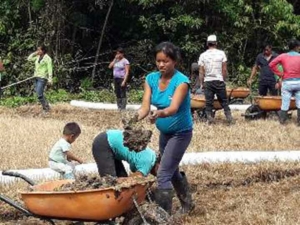

Figure 13. The whole family helping with the installation of pipes to improve the drainage of an airstrip
The remaining 22 communities depend entirely on footpaths to the airstrips of neighbouring communities or the closest towns where produce can be sold, and supplies purchased. The principal products sent to market are those that can withstand transport by mule or horse. Aurania has funded the materials for two pulley-operated cable systems that provide a means of crossing wide and powerful rivers, facilitating access between communities and with adjacent towns.
There is ubiquitous use of social media among the younger generation throughout the DAI. Smartphones and computers are charged from electricity from diesel generators and solar panels. Internet access is limited to the vicinity of a few satellite dishes.
Suppliers and Small Business Opportunities
Aurania has registered for access to the internet service to be provided by Starlink in 2022. Access to fast internet is likely to be transformational to the remote communities in the DAI.
Aurania has provided an interface through which the tax authorities have been able to help suppliers to formalize their accounting and issue invoices containing information required for Aurania to be able to purchase goods and services from them. Approximately 30 small businesses and contractors went through this registration process.
In 2020, the Company spent US$1.24 million on services and supplies from the local companies in the town of Macas where the field office is located.
Production and Marketing
The diet of most communities in the DAI is based largely on cassava root and therefore is limited in nutritional value. Due to the growth of the Shuar population, access to protein derived from the jungle has become more limited over time, necessitating access to other sources of protein.
The Company is supporting communities to grow other cash crops and plants of high nutritional value identified by the Ministry of Agriculture through joint training sessions with the Ministry. Suitable cash crops are those that are easy to transport on mules and horses from remote and isolated areas. In addition, training programs are being developed and run on best practices for production from small plots of land. The Company has implemented the Rural Family Farming Program developed by the Ministry of Agriculture in order to enhance the knowledge of small farmers on best practices, and on alternative crops suitable to the climatic and soil conditions of the Cutucu mountain range. Five women and five men participated in the hands-on training sessions on best practices to produce these crops.
Training programs have been designed to add value to the ancestral culinary culture of the Shuar people and to provide education about nutrition and its relationship to health. Fifty-one Shuar women, who are traditionally responsible for agriculture, attended the training courses.
Livestock provides another source of economic benefit for Shuar people living in remote and isolated areas. The lack of veterinary assistance and access to medicine results in many of the animals from the region not having been inoculated against prevalent diseases, which reduces their value in the market. In addition, animals that are to be sold need to walk for days to reach the commercial centres, resulting in loss of weight, loss of general condition and sometimes injury which exacerbates the loss of value in comparison to livestock produced in less remote areas. In recognition of these problems, the Company is working with the Association of Charolais Cattle Breeders and the Ministry of Agriculture to train Indigenous communities in basic animal husbandry and inoculation techniques. Twelve delegates from ten communities were trained as technicians to inoculate livestock in remote communities. Transportation costs and material for training were provided by Aurania and vaccines were provided by the Ministry of Agriculture in a joined effort.
Humanitarian Aid
In response to the travel restrictions imposed by the Ecuadorian government and the dearth of employment opportunities during the COVID-19 pandemic, Aurania purchased and delivered dry food including rice, lentils, beans and canned fish to the communities within the area of influence of the Lost Cities Project in the second quarter, 2020. The first food delivery took place between April 3-6 in which 8 tonnes of food were delivered to 970 families in 44 communities. The second was between April 27-29 in which 10 tonnes of food were delivered to 1,292 families in 49 communities. The second relief effort was made in conjunction with the Step Forward Foundation, the Ministry of Social Inclusion with the help of the logistics arm of the Ecuadorian military.
